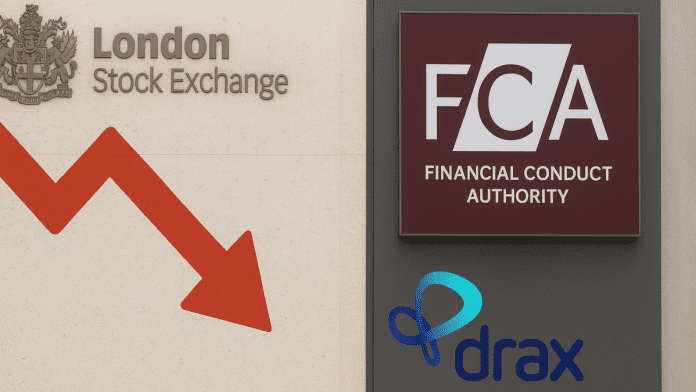🕒 Last updated on August 28, 2025
The UK’s financial watchdog has started an official investigation into Drax Group, a major energy company that runs biomass power plants in Britain. The Financial Conduct Authority (FCA) is investigating whether Drax’s 2021–2023 annual reports contained statements that adhered to appropriate financial disclosure guidelines.
FCA launches probe into Drax’s reporting
This new probe comes after Britain’s energy regulator had already fined the company last year. At that time, the fine was £25 million after it was found that Drax had misreported some information about the wood it was sourcing from Canada.
The FCA investigation focuses on what Drax told investors and the public between January 2022 and March 2024. The company has said it is cooperating with the regulator but has not shared more details about the case.
The announcement immediately affected Drax’s position in the stock market. The company’s shares dropped more than 12% when news of the investigation was made public. Later in the morning, shares recovered slightly, showing a fall of just over 9%.
Concerns over biomass sourcing
Drax supplies about 5% of Britain’s electricity. It does this by burning wood pellets that replace coal in its power plants. For years, the company has received billions of pounds in subsidies from the government to support this shift to renewable energy.
Environmental groups have often raised concerns about the company’s methods of sourcing biomass. Campaigners argue that cutting down trees and transporting them across long distances can harm the environment rather than protect it.
In particular, questions have been raised about wood sourced from forests in Canada. Critics say this practice damages ecosystems and threatens long-term sustainability.
Drax has defended itself against these claims. The company states that it does not cut down whole trees just for burning. Instead, it says the material used is made up of wood residuals and byproducts left over from the lumber industry. According to Drax, these byproducts would otherwise go to waste, and their use can actually support managed forests. The company also believes that demand for wood from sustainable sources encourages forest growth rather than reduces it.
In its earlier review, Ofgem, the energy regulator, did not find that Drax had broken sustainability rules. Ofgem also said there was no evidence that Drax had wrongly claimed renewable obligation certificates, which are important for companies receiving green subsidies.
Political and financial impact
The fresh investigation by the FCA has once again placed Drax under intense scrutiny. Analysts say this could increase political debate around the government’s support for biomass power after 2027. Current plans would see subsidies for Drax cut by half between 2027 and 2031.
Trump move to remove Fed governor Cook raises debate over limits of presidential authority
The FCA’s probe also adds more weight to ongoing discussions about how Britain should manage its clean energy transition. The government wants to largely decarbonize the electricity sector by 2030. To reach that goal, the country will need not only biomass but also many new renewable projects such as wind and solar, along with new infrastructure like pylons to connect them to the grid.
While these wider debates continue, the focus right now is on Drax’s reporting practices. The FCA is carefully checking whether all the details shared in the company’s financial statements were complete and accurate. This is important because investors, regulators, and the public rely on these reports to understand how companies are performing and whether they are meeting legal and environmental responsibilities.
Drax has stated that it intends to achieve net zero carbon emissions throughout its whole value chain by the end of 2024, notwithstanding the concerns. However, the current investigation ensures that the company’s activities and disclosures remain under the spotlight, attracting close attention from regulators, markets, and campaign groups alike.

